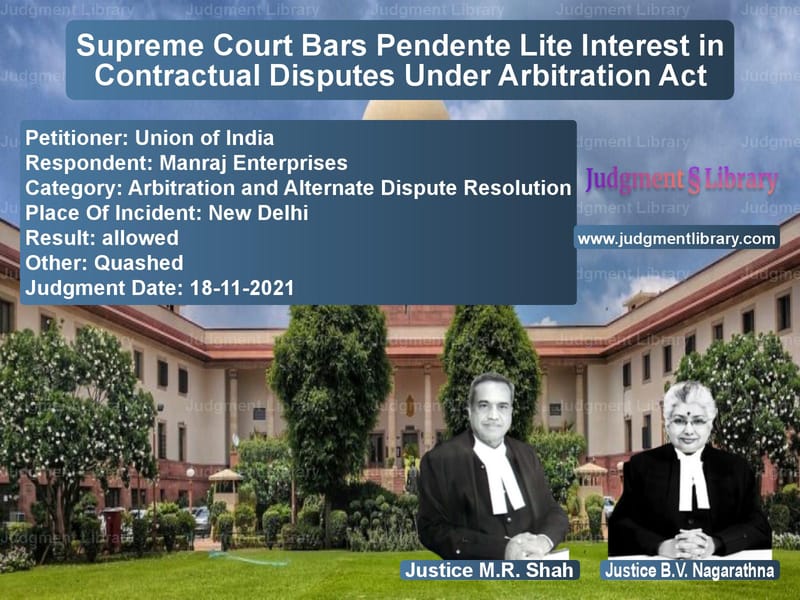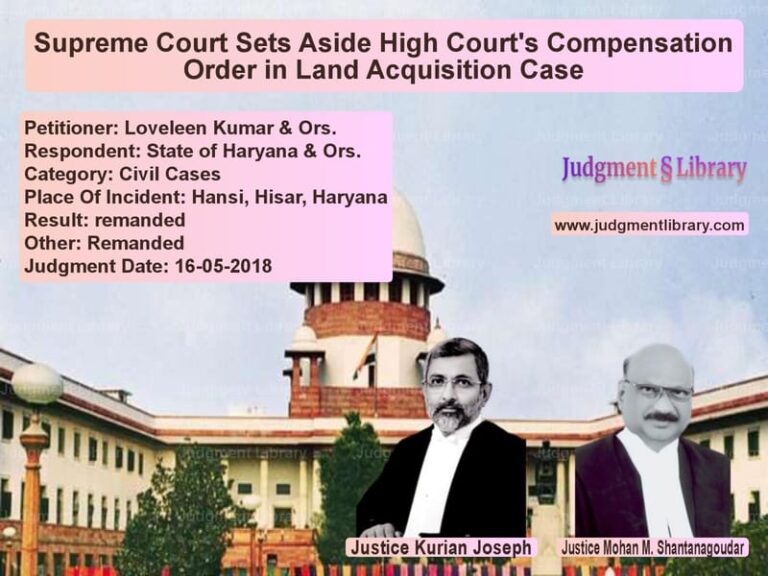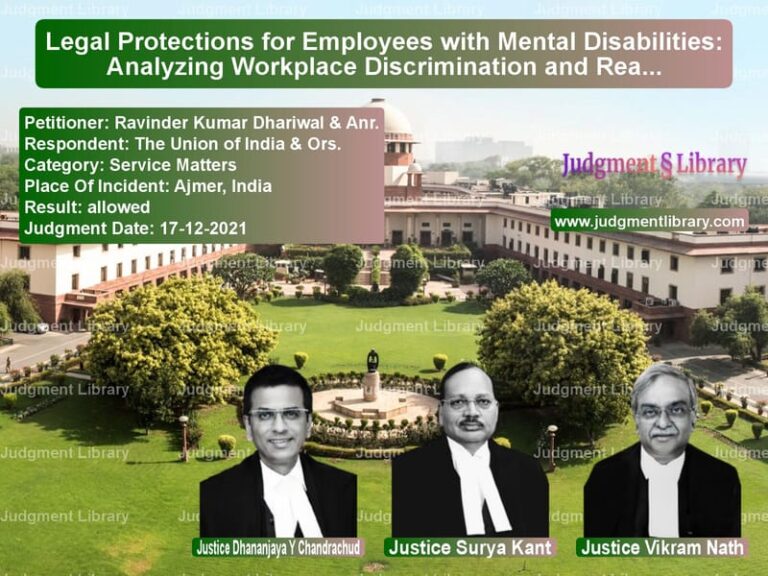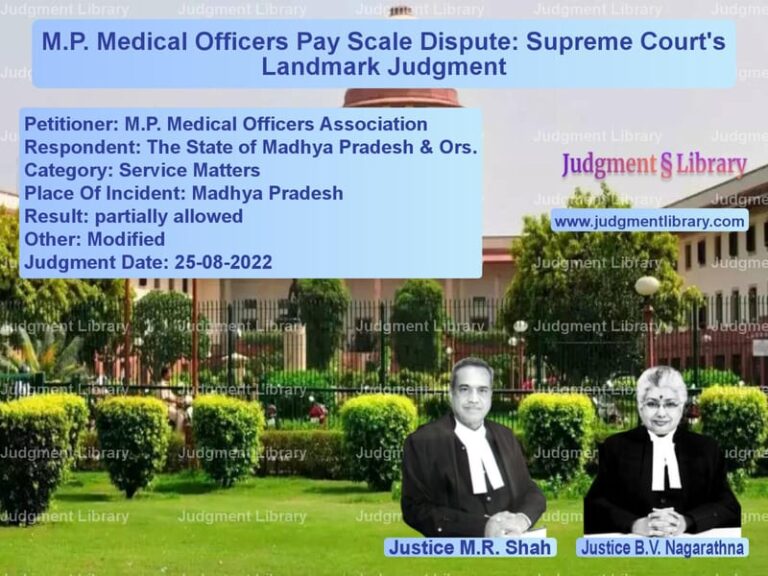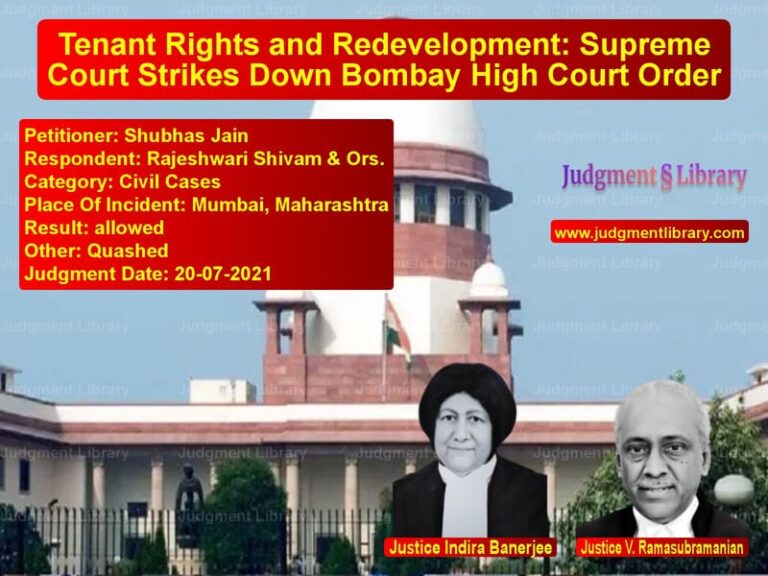Supreme Court Bars Pendente Lite Interest in Contractual Disputes Under Arbitration Act
The case of Union of India vs. Manraj Enterprises revolves around the legal question of whether an arbitrator can award pendente lite (during litigation) and future interest when the contract explicitly bars such payments. The Supreme Court had to determine whether the arbitrator overstepped his jurisdiction in awarding interest despite the presence of a specific prohibition in the contract.
Background of the Case
The dispute arose from a contract between the Union of India and Manraj Enterprises concerning three work contracts. Due to disagreements, both parties resorted to arbitration. The sole arbitrator, in his award dated 17th January 2011, granted the respondent an amount of Rs. 78,81,553.08 and also awarded:
- Pendente lite interest at 12% on the awarded amount, excluding earnest money and security deposits.
- Future interest at 18% on the awarded amount.
The Union of India challenged the arbitral award under Section 34 of the Arbitration and Conciliation Act, 1996, arguing that the contract explicitly barred interest payments. The challenge was dismissed by the Single Judge of the High Court. The Division Bench also upheld the arbitrator’s decision, leading to an appeal before the Supreme Court.
Arguments by the Appellant (Union of India)
- The contract contained a clear bar against the payment of interest under Clause 16(2) of the General Conditions of Contract (GCC).
- Section 31(7)(a) of the Arbitration Act allows an arbitrator to award interest “unless otherwise agreed by the parties.” In this case, the parties had already agreed to prohibit interest payments.
- Similar clauses have been upheld by the Supreme Court in past judgments, such as Union of India v. Bright Power Projects (India) (P) Ltd. and Garg Builders v. Bharat Heavy Electricals Limited, which confirmed that when a contract explicitly bars interest payments, an arbitrator has no authority to award them.
- The phrase “amounts payable to the contractor under the contract” in Clause 16(2) of the GCC was broad enough to cover all payments due under the contract, not just earnest money and security deposits.
- The arbitrator’s award of pendente lite interest exceeded his jurisdiction and went against contractual obligations agreed upon by both parties.
Arguments by the Respondent (Manraj Enterprises)
- Clause 16(2) of the GCC only prohibits interest on earnest money and security deposits, not on other payments due under the contract.
- The Supreme Court’s previous decisions, such as Secretary, Irrigation Department, State of Orissa v. G.C. Roy, allowed arbitrators to award interest unless explicitly prohibited.
- The contract did not explicitly bar pendente lite interest; it only restricted pre-award interest on specific deposits.
- The Union of India itself had claimed 18% interest in its counterclaims, indicating that interest claims were not entirely barred.
Supreme Court’s Observations
The Supreme Court bench, comprising Justices M.R. Shah and B.V. Nagarathna, analyzed whether the arbitrator had the authority to award pendente lite interest.
The Court ruled:
“Once the contractor agrees that he shall not be entitled to interest on amounts payable under the contract, the arbitrator has no power to award interest contrary to the terms of the agreement.”
Key Findings
- Binding Nature of Contract Terms: The Court reiterated that contractual clauses barring interest are enforceable, and arbitrators cannot override them.
- Applicability of Section 31(7)(a) of the Arbitration Act: The phrase “unless otherwise agreed by the parties” means that when a contract prohibits interest, the arbitrator lacks the power to grant it.
- Principle of Ejusdem Generis Not Applicable: The Court rejected the argument that the prohibition applied only to earnest money and security deposits, affirming that it extended to all amounts payable under the contract.
Final Judgment
The Supreme Court ruled that:
- The judgments of the High Court were set aside.
- The arbitrator’s award of pendente lite and future interest was quashed.
- In light of Clause 16(2) of the GCC, the contractor was not entitled to any interest on the awarded amount.
Impact of the Judgment
This ruling has significant implications for arbitration law and contractual disputes:
- Strict Adherence to Contractual Clauses: The judgment confirms that arbitrators must strictly follow contract terms.
- Limited Scope for Judicial Interference: Courts will uphold explicit contractual prohibitions on interest.
- Prevention of Judicial Overreach: Arbitrators cannot use equity principles to grant relief beyond what the contract permits.
Conclusion
The Supreme Court’s decision in Union of India vs. Manraj Enterprises reinforces the importance of contractual obligations and the limits of arbitral discretion. This judgment ensures that arbitration remains a mechanism for dispute resolution based strictly on agreed terms, preventing excessive judicial intervention in commercial contracts.
Petitioner Name: Union of India.Respondent Name: Manraj Enterprises.Judgment By: Justice M.R. Shah, Justice B.V. Nagarathna.Place Of Incident: New Delhi.Judgment Date: 18-11-2021.
Don’t miss out on the full details! Download the complete judgment in PDF format below and gain valuable insights instantly!
Download Judgment: union-of-india-vs-manraj-enterprises-supreme-court-of-india-judgment-dated-18-11-2021.pdf
Directly Download Judgment: Directly download this Judgment
See all petitions in Arbitration Awards
See all petitions in Dispute Resolution Mechanisms
See all petitions in Enforcement of Awards
See all petitions in Judgment by Mukeshkumar Rasikbhai Shah
See all petitions in Judgment by B.V. Nagarathna
See all petitions in allowed
See all petitions in Quashed
See all petitions in supreme court of India judgments November 2021
See all petitions in 2021 judgments
See all posts in Arbitration and Alternate Dispute Resolution Category
See all allowed petitions in Arbitration and Alternate Dispute Resolution Category
See all Dismissed petitions in Arbitration and Alternate Dispute Resolution Category
See all partially allowed petitions in Arbitration and Alternate Dispute Resolution Category

